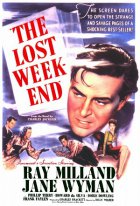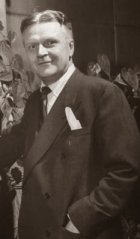
The Lost Weekend Page #9
- NOT RATED
- Year:
- 1945
- 101 min
- 967 Views
B-9 THE STAGE
The set is a Louis XIVth salon, in the year 1700. It's
Violetta's supper. The guests are singing "Libiamo, libiamo,"
which is a drinking song in waltz time.
B-10 DON
He loves music and especially Italian opera, but maybe he'd
have come late if he'd remembered the content of the first
scene.
B-11 ON THE STAGE
Powdered footmen are pouring wine into the glasses of the
over-vivacious guests.
B-12 DON
Thirst in his eyes, he looks away from the stage, tries to
concentrate on the ceiling of the Metropolitan. No go. His
eyes wander back to:
B-13 THE STAGE
Alfred and Violetta are batting the drinking song back and
forth, as the chorus, glasses in hand, stands slowly swaying,
echoing each couplet.
B-14 DON
That thirst is coming up again. The first drops of sweat are
gathering on his forehead. As he looks at the stage, his
imagination is working at top speed.
B-15 STAGE
The swaying echelon of choristers SLOWLY DISSOLVES to a row
of raincoats, exactly like the one Don wore. They hang from
hangers and sway slowly to Verdi's rhythm.
B-16 DON'S FACE
His eyes glued to what he sees on the stage. He takes the
handkerchief from his pocket and wipes his forehead.
B-17 THE STAGE
The raincoats swaying slowly. THE CAMERA APPROACHES one of
them. From the pocket projects a bottle of whiskey.
B-18 DON
He is wiping his parched mouth. He puts the handkerchief
back. He fishes the coat check from his pocket, buries it in
his fist, fighting the foolish impulse. It's a short struggle,
which he loses. He rises and, to the irritation of his
neighbors, leaves his seat amid some disapproving shushings
from the row behind.
DISSOLVE TO:
It is completely empty save for the elderly attendant, who
is dozing over his paper. From inside comes Verdi's music
and Don Birnam. He puts the check on the counter. The
attendant looks up from a newspaper.
ATTENDANT:
Did you forget something?
DON:
No. Going home, if it's all right
with you.
The attendant takes the check and leaves. Don rolls his
program and sticks it into the sand of the cuspidor. He is
filled with a nervous anticipation of the drink which is on
its way. The attendant returns.
ATTENDANT:
Say, this isn't yours.
Don looks. The attendant holds a short leopard coat and a
lady's small umbrella.
DON:
No, it certainly isn't.
ATTENDANT:
(Comparing the check
with the number on
the hanger)
That's what it says though -- 417.
DON:
I don't care what it says.
ATTENDANT:
The checks must have got mixed up.
DON:
Maybe they did. Find me my coat.
It's a plain man's raincoat and a
derby.
ATTENDANT:
Are you kidding? Do you know how
many plain men's raincoats we have
on a day like this? About a thousand.
DON:
Let me get back there. I can find
it.
ATTENDANT:
That's against regulations, sir.
DON:
I'm not going to wait till the end
of the performance.
ATTENDANT:
You can get your coat tomorrow.
Don's nervousness is mounting. He is searching his pockets.
DON:
Look, man, there's something in the
pocket of that coat I -- It so happens
I find myself without any money and
I need that coat. And I need it now.
ATTENDANT:
Listen, if everybody went in there
digging through those coats... There's
regulations. There's got to be
regulations.
DON:
What do you suggest?
ATTENDANT:
You just wait till the other party
comes and then you can swap.
DON:
I want my coat.
ATTENDANT:
As far as I'm concerned, that's your
coat.
He shoves the leopard coat and umbrella close to Don.
DON:
You're a great help.
He is biting his lips, unable to find another argument. The
attendant has returned to the other end of the counter and
resumed his doze. Don gets out a cigarette. Without opening
his eyes, the attendant calls it.
ATTENDANT:
No smoking.
DON:
(Sourly)
I thought so.
He puts the cigarette away, leans back on the counter, arms
folded.
DISSOLVE TO:
B-20 VESITBULE, NEAR CLOAK ROOM
Empty, save for Don, who paces up and down nervously, carrying
the leopard coat and the umbrella. He glances over the coat
a little, at the initials inside, at the label. Over the
scene comes a muted aria from the second act.
DISSOLVE TO:
B-21 A STAIRCASE LEADING TO THE GALLERY
Empty, save for Don, who sits on a step, the coat next him.
With the umbrella he is nervously tracing the pattern in the
carpet. Inside, the music rises to a finale and the first
people start streaming down from the gallery. Don grabs up
the coat and hurries towards the cloak room.
B-22 VESTIBULE AND CLOAK ROOM
People are streaming up from all sides to get their
belongings. Don comes into the shot and, standing on his
toes, tries to locate the claimant of his coat and hat.
DISSOLVE TO:
It is almost empty. Don still stands with the coat, looking.
As the last few people leave, at the far end of the counter
he sees Helen, in a little leopard hat, his coat over her
arm, his derby in her hand. She sees him with her coat and
her umbrella and the two approach slowly.
DON:
(Trying to control
his irritation)
That's my coat you've got.
HELEN:
And that's mine, thank heaven. They
mixed up the checks.
DON:
They certainly did. I thought you'd
never come.
He takes his coat rather brusquely, thrusts the leopard coat
at her.
HELEN:
You can't have been waiting so long.
DON:
Only since the first aria of the
first act. That's all.
HELEN:
Do you always just drop in for the
overture?
Don takes the coat, feels it hurriedly to make sure the bottle
is still there, and starts away.
DON:
Goodbye.
Helen is left with the leopard coat and his bowler.
HELEN:
(Waving the hat toward
Don)
Hey, wait a minute!
Don comes back, takes the hat, starts away again.
HELEN:
My umbrella, if you don't mind.
His patience exhausted, Don stops again, takes the umbrella
and tosses it in Helen's direction. Helen, who is getting
into her coat, can't catch it. It falls right next to her.
HELEN:
Thank you very much.
Don stands abashed. He goes back, picks up the umbrella.
DON:
I'm terribly sorry.
HELEN:
You're the rudest person I ever saw.
What's the matter with you?
DON:
Just rude, I guess.
HELEN:
Really, somebody should talk to your
mother.
DON:
They tried, Miss St. John.
HELEN:
My name's not St. John.
DON:
St. Joseph, then.
HELEN:
St. James.
DON:
First name Hilda or Helen, or Harriet
maybe?
HELEN:
Helen.
DON:
You come from Toledo, Ohio.
HELEN:
How do you know?
DON:
I've had three long acts to work you
out from that coat of yours. Initials,
label -- Alfred Spitzer, Fine Furs,
Toledo, Ohio.
HELEN:
Maybe I should have explored your
coat.
DON:
But you didn't.
HELEN:
Didn't have time.
DON:
Good. My name is Don Birnam.
As they go on talking, they walk from the cloak room, through
the vestibule, to the street, Don carrying his coat over his
arm.
Translation
Translate and read this script in other languages:
Select another language:
- - Select -
- 简体中文 (Chinese - Simplified)
- 繁體中文 (Chinese - Traditional)
- Español (Spanish)
- Esperanto (Esperanto)
- 日本語 (Japanese)
- Português (Portuguese)
- Deutsch (German)
- العربية (Arabic)
- Français (French)
- Русский (Russian)
- ಕನ್ನಡ (Kannada)
- 한국어 (Korean)
- עברית (Hebrew)
- Gaeilge (Irish)
- Українська (Ukrainian)
- اردو (Urdu)
- Magyar (Hungarian)
- मानक हिन्दी (Hindi)
- Indonesia (Indonesian)
- Italiano (Italian)
- தமிழ் (Tamil)
- Türkçe (Turkish)
- తెలుగు (Telugu)
- ภาษาไทย (Thai)
- Tiếng Việt (Vietnamese)
- Čeština (Czech)
- Polski (Polish)
- Bahasa Indonesia (Indonesian)
- Românește (Romanian)
- Nederlands (Dutch)
- Ελληνικά (Greek)
- Latinum (Latin)
- Svenska (Swedish)
- Dansk (Danish)
- Suomi (Finnish)
- فارسی (Persian)
- ייִדיש (Yiddish)
- հայերեն (Armenian)
- Norsk (Norwegian)
- English (English)
Citation
Use the citation below to add this screenplay to your bibliography:
Style:MLAChicagoAPA
"The Lost Weekend" Scripts.com. STANDS4 LLC, 2025. Web. 11 Feb. 2025. <https://www.scripts.com/script/the_lost_weekend_173>.







Discuss this script with the community:
Report Comment
We're doing our best to make sure our content is useful, accurate and safe.
If by any chance you spot an inappropriate comment while navigating through our website please use this form to let us know, and we'll take care of it shortly.
Attachment
You need to be logged in to favorite.
Log In